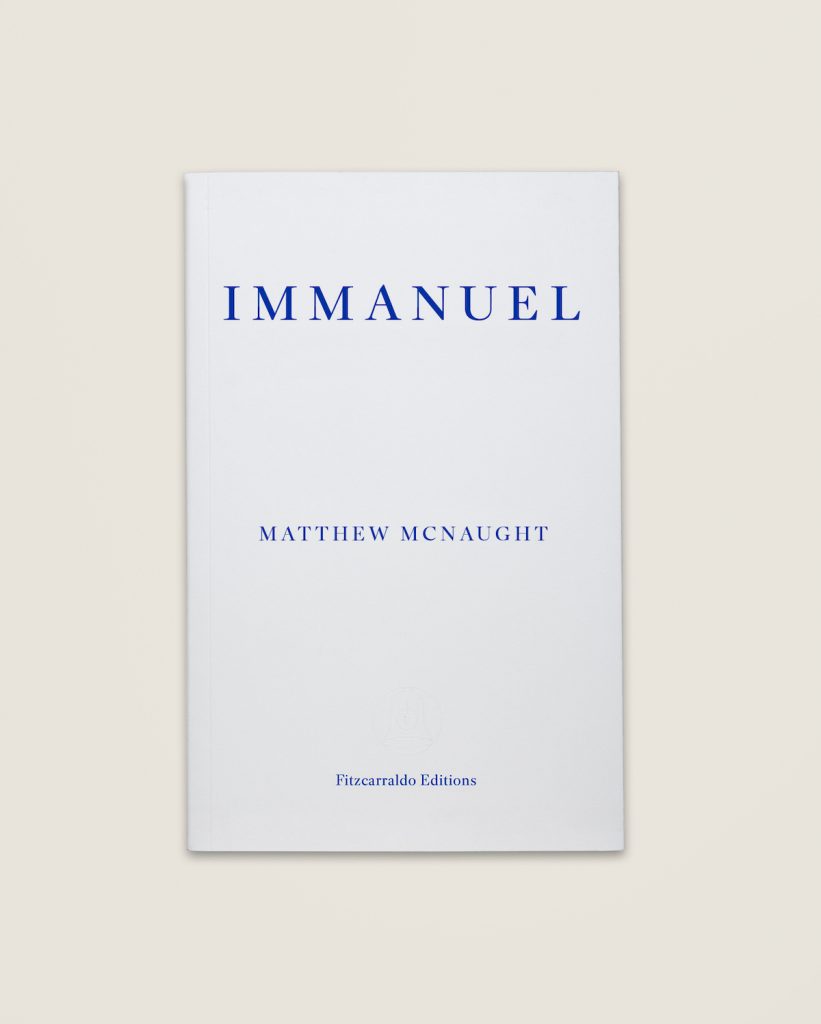
With the carelessness you’ve come to expect from me, I totally missed the 11th anniversary of the blog this week. Yes, it was in the week in July 2011 that I first decided you all needed to know just how slapdash my parenting was in a series of loosely-connected ramblings. 700 and something of them so far.
But it just so happens that I did have a fun trip out on the day itself. I went to a book launch, to celebrate a book that emerged from a different blog that I contributed a post to in 2011. The blog was about a Nigerian pastor called TB Joshua who I really knew very little about but I wanted to help my friends so I wrote a little musing about the church we grew up in. I linked to it on this early-days post.
My little article was pretty flimsy and received the most lukewarm of all reviews from a regular commenter:
“I honestly believed this post was a bit of a non-issue”
But there was a germ of an idea in it, which the founder of the blog has now turned into a fully-fledged book. It’s been a surreal experience, seeing people write about a book that described my childhood but, post-launch, I thought I should contribute my own review. Which hopefully won’t write the whole thing off as a “non-issue”.
Some scene-setting first though! The launch was at the lovely bookshop Ink@84, which is somewhere between Finsbury Park and Clissold Park. I was on a tight timescale, thanks to my most slapdash piece of parenting yet, so leapt on to the tube as the doors were closing, giving myself a most impressively Londonish injury.
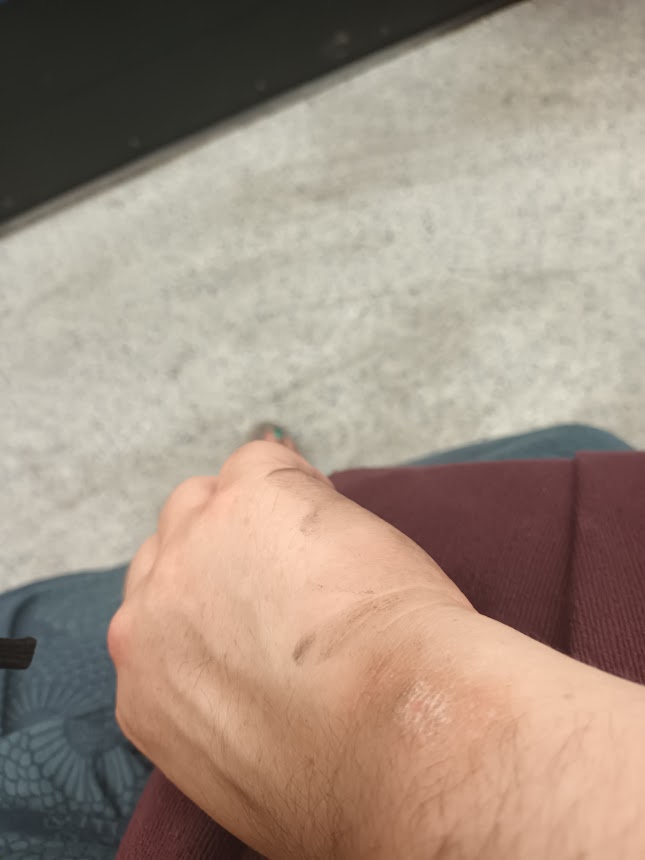
The grime of it all!
When I got to Finsbury Park, I knew where to get the bus from as I’d packed a couple of tweens onto it after Reuben’s birthday expedition to the Sobell Centre in June. Finsbury Park is an extremely confusing interchange and we’d ended up charging down the middle of a bus lane that one of the tweens assured me was “perfectly safe” to catch a bus that then didn’t move for hours. There’s also a whole other bit of bus station behind the station which is now linked up with a shiny new bit and a giant M&S Food Hall. I feel like I wrote a blog post about the last time I was there, on my way back from Muswell Hill but apparently I didn’t. Neither did I blog about the futile quest to find a place that would feed the tweens and teens pizza pre-Sobell Centre. Eventually went to a Greek place. Long story.
Anyway, all of that meant a good swift change onto a bus at Finsbury Park and I arrived slightly sweaty but in plenty of time for the reading. Ink@84 has a drinks counter as well as lots of books. Much as I was tempted by a glass of wine, I thought a rhubarb soda was much more sensible when it was so hot and I’d been running. Very nice it was too.
Do you actually want me to get onto basic information about the book now? Well, in the words of Isaiah 7:14, it is “called Immanuel” and it’s written by a childhood friend of mine, Matthew McNaught. It’s about the same prophet that we discussed endlessly on that blog in 2011 but its main focus is the small provincial church we grew up in and how that church came to entangle itself with the prophet.
It’s really hard to objectively review this book, which is probably I rambled about pizza and bus stations for so long. Matt’s text brings Immanuel back to life in a way that made tears spring to my eyes as I read it. It was waiting for me as I got home from work drinks a few weeks ago and I was trying to hold back from immersing myself in it but it was impossible. As I absentmindedly ate chips with BBQ sauce (so much for that snowy-white cover) I tried to watch Taskmaster but kept picking it back up again. I read late into the night and on the train next morning. Unusually for me, I avoided sitting with someone I knew just so I could read. Walking through Liverpool Street, I reached the evocative section about the old ads in the church magazine and pulled my sunglasses on in case anyone spotted the tears welling up in my eyes.
I walked past a more recently-left church of ours, still immersed in the 1990s version of Christianity. I went to Pret on the corner of Great Winchester Street, smirking to myself at the coincidence, and read about eating homemade rice krispie cakes while awaiting my soy latte and croissant. My body was going through the motions of a 40-something London dweller but my mind was back to being a 10-year-old in Hampshire. It was only when I reached my office that I pulled myself together and decided I needed to put the book away and focus. Otherwise I could easily have kept reading all morning.
Matt’s always been an extraordinary writer. At the age of 8 or so, he was writing poems about flowers for the church magazine that put the adults to shame. His father is also a gifted poet. We’ll skim over the attempts at worship songs Matt wrote in his teens but I still have the lyrics in my head. And, while we’re on the subject of Matt as a teen, I still have the embarrassing photos. Oh yes, I do.
The book had drawn me in and I felt disconnected to the real world for days. As my Facebook news feed and inbox filled with ex-Immanuelites wanting to discuss it, I could think of little else. Even with a pair of choir gigs and the aforementioned child’s birthday trip the weekend after I’d started reading, my mind felt elsewhere.
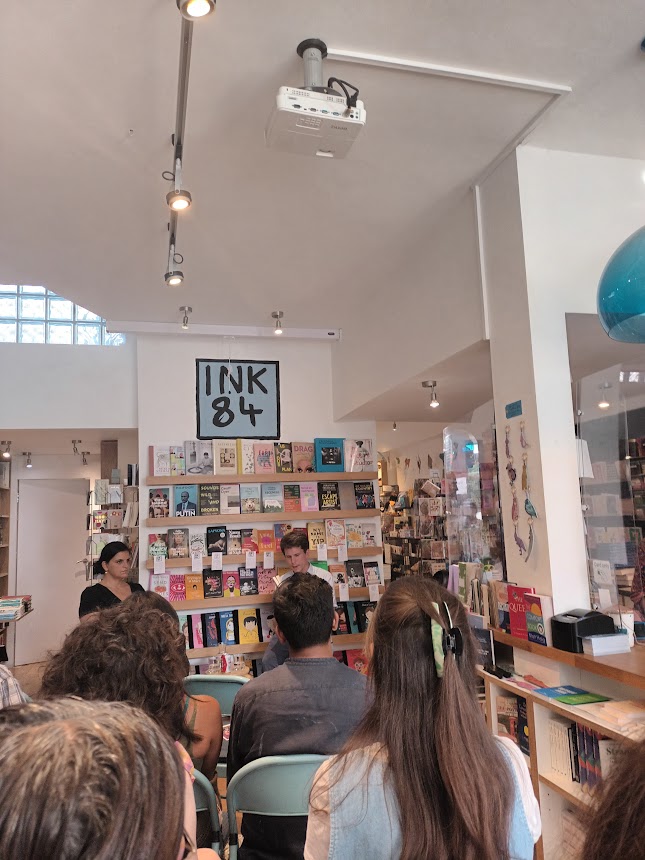
And now here I was, in a room full of people who were here to learn about my childhood through the lens of someone else. As I say, most surreal. I was glad of the company of a current church friend to keep me grounded and who I could whisper asides to – “That’s my brother’s name!”, “Yes, there really were a lot of courtesy drops in our church”, “so what he’s saying is he basically plagiarised my blog post”.
Matt read a little from the preface and Chapter 1 of the book before being interviewed by author and journalist Samira Shackle. She asked some really insightful questions and managed to draw Matt – who is a modest guy – out a little and really talk about the meat of his book. He’s endlessly self-deprecating but it’s a fascinating read. Just from the variety of people who’d gathered in the room, you could tell it was a subject that interested Christians, agnostics, atheists, people of other religions….we all came from different viewpoints but the ideas that were being discussed were universal. The importance of community to your sense of self. The momentum that comes from corporate movements like worship and how it’s easier to be swept up than to be the one slamming on the brakes. The longing for something in your childhood that’s missing from your adulthood.
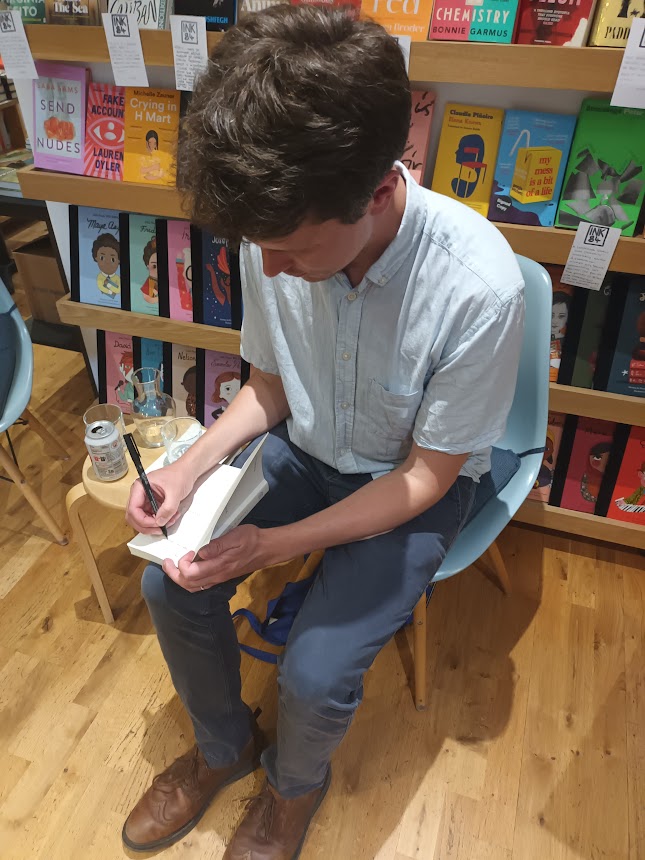
Having said that, it is a challenging read for evangelical Christians. It’s written from the perspective of someone who’s lost their faith and many of the people in the story have found themselves embracing a quieter, simpler kind of Christianity. The scars left by the extremes of Immanuel run deep and there’s so much more that wasn’t in the book. Since I’ve been having these conversations with people from my old church, I’ve learnt about what went on between adults that us kids were never aware of. It’s been fascinating getting reacquainted with people who were the grown-ups in the church when I was a teen and who had a different perspective on it that I’d been somewhat shielded from. I’ve started writing about my own experiences in the church but I have no idea whether I’ll publish it on the internet anywhere. Certainly not here on LWAT, which isn’t usually a place for theological naval-gazing. But I’m making an exception today because this did at least place in London and there was a slightly-past-toddlerhood child there so it’s on London With a Toddler turf. Plus, they had some lovely children’s books there. Go visit!
But if I can indulge in a touch more naval-gazing for a moment, I do believe that Christians should read this book. It sets out a roadmap for what churches shouldn’t do. It looks at the issues of putting too much store in prophetic words and dreams, especially when those words become divisive and what Matt calls “passive-aggressive”. I’ve long been averse to untested prophecy and this only reinforces why I feel that way. The hurts in this book are immense, and the broken families left in the wake of the church’s demise are a warning to us all. Immanuel was the best of churches and the book paints a vivid picture, alongside the beautiful postcard designed by Matt’s brother Jonathan. This image just *is* the Immanuel I knew. I assume Jonathan is not quite the tiny cute blond boy I knew but still, he’s done an amazing job:
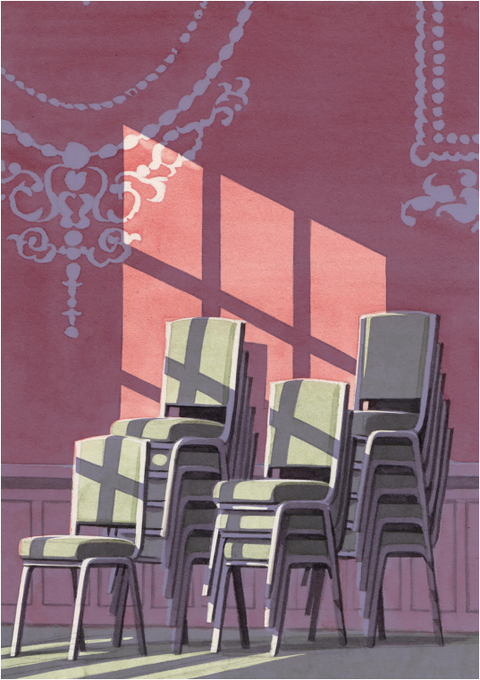
Original graphic by Jonathan McNaught
I should say, I have not heard from everyone I knew in those days. I’m guessing some have chosen not to read the book and some might have read it and are feeling hurt or betrayed. I don’t know. I don’t speak on their behalf. I only speak for myself when I say I’m glad he wrote it. It’s been an emotional journey but the overwhelming feeling I had at the launch was pride. Not the sinful kind, the good kind. Pride in the wonderful community we once had and pride in Matt’s achievements. But of course I didn’t wanna say anything slushy to him and instead just bullied him into writing me a formal apology for the plagiarism but also for using my actual name for a person in the book who clearly is not me if you know me well enough but at a glance might raise a few eyebrows.
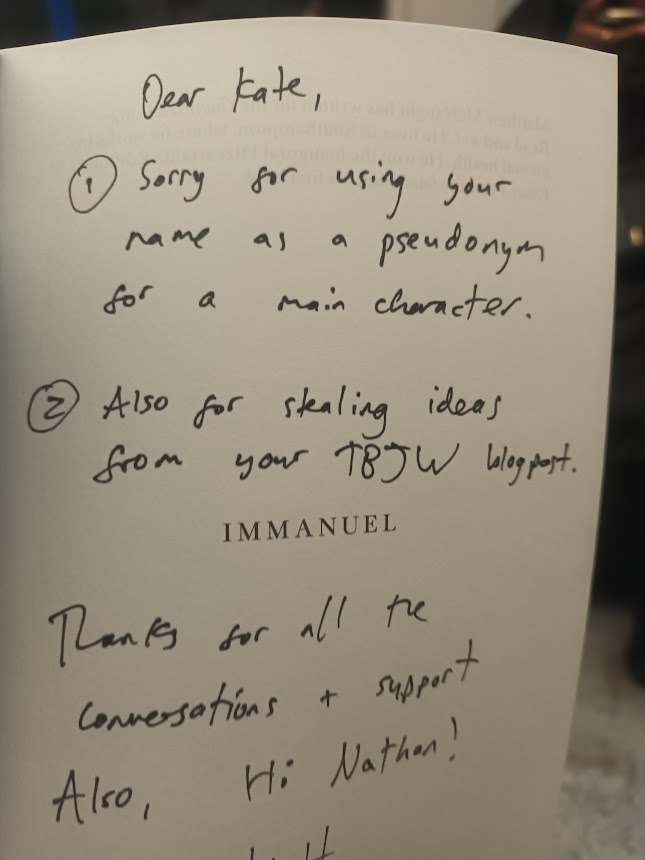
So that’s righted those wrongs.
Where to go from here? Well, it’s certainly inspired me to write about my own experiences with the church which were devastating at the time but also formative. More though, it’s inspired me to reconnect with people from my past. I’d love to go for a coffee with them and chat over this stuff. So if you’re one of them, please do get in touch either through the contact page of the blog or through Facebook or Twitter if we know each other there. It might not be cathartic writing a whole book about this stuff but it’s certainly cathartic to talk about it.
“Immanuel” by Matthew McNaught is available from Fitzcarraldo Editions now. Believe it or not, I actually paid for this one (twice!) rather than trying to blag a review copy so no disclaimer needed but in case you were in any doubt, all opinions remain honest and my own.




